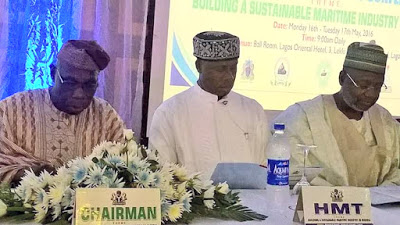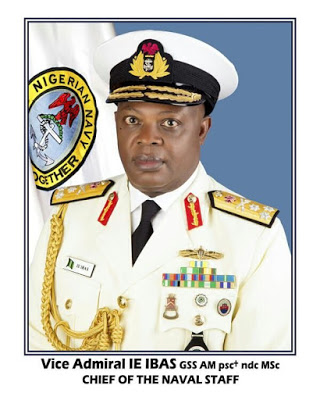Former
President of Nigeria, Chief Olusegun Obasanjo, on Monday advised against the use of government funds in re-floating a new national shipping line, considering the waste and mismanagement suffered by the former Nigerian National Shipping Line(NNSL).
The former
president was speaking as the chairman at the opening of a two-day maritime
stakeholders’ summit on building a sustainable maritime industry, holding at
the Oriental Hotel, Victoria Island, Lagos.
president was speaking as the chairman at the opening of a two-day maritime
stakeholders’ summit on building a sustainable maritime industry, holding at
the Oriental Hotel, Victoria Island, Lagos.
He said the maritime industry in Nigeria had
huge potential capable of re-positioning the nation’s economy if and when the
appropriate reforms were done.
He advised that the Nigerian maritime industry be driven on a Private, Public Participation (PPP) model for effective service delivery and economic benefits for the nation.
huge potential capable of re-positioning the nation’s economy if and when the
appropriate reforms were done.
He advised that the Nigerian maritime industry be driven on a Private, Public Participation (PPP) model for effective service delivery and economic benefits for the nation.
Obasanjo
suggested that maritime institutions such as the Nigerian Maritime Administration
and Safety Administration (NIMASA), the Nigerian Ports Authority (NPA) the
Nigerian Shippers’ Council and the National Inland Waterways Authority (NIWA) would
be more efficient if modeled after the structure of the LNG.
suggested that maritime institutions such as the Nigerian Maritime Administration
and Safety Administration (NIMASA), the Nigerian Ports Authority (NPA) the
Nigerian Shippers’ Council and the National Inland Waterways Authority (NIWA) would
be more efficient if modeled after the structure of the LNG.
According to
the former president, the LNG, unlike the NNPC, is performing well and
sustained in its delivery and growth because of the 51 per cent private
participation and government’s 49 per cent investment.
the former president, the LNG, unlike the NNPC, is performing well and
sustained in its delivery and growth because of the 51 per cent private
participation and government’s 49 per cent investment.
He also made
reference to the performance of the telecommunication sector, which he said
succeeded because it was put in private hands to run.
reference to the performance of the telecommunication sector, which he said
succeeded because it was put in private hands to run.
“With privatization of the telecommunications,
in less than 10 years there are over 20 million lines and government did not
out a dime in it,” Obasanjo said.
in less than 10 years there are over 20 million lines and government did not
out a dime in it,” Obasanjo said.
He described the experience of the Nigerian
National Shipping line and the Nigerian Airways as ‘heartbreaking’ and urged
the transportation minister not to commit government funds into floating a new
national shipping line, considering how 19 ships in the fleet went underground
within 20 years.
National Shipping line and the Nigerian Airways as ‘heartbreaking’ and urged
the transportation minister not to commit government funds into floating a new
national shipping line, considering how 19 ships in the fleet went underground
within 20 years.
Also
speaking, the Minister of Transportation, Hon. Rotimi Amaechi, said this
administration was interested in reforms for meaningful change to benefit the
economy, much as the operators in the various sub-sectors of the industry.
speaking, the Minister of Transportation, Hon. Rotimi Amaechi, said this
administration was interested in reforms for meaningful change to benefit the
economy, much as the operators in the various sub-sectors of the industry.
He gave assurance
to come up with an all-embracing maritime policy for Nigeria, while ensuring a
safe and secure environment for both foreign and indigenous investors, for them
to reap returns on investment and ensuring economic benefits to Nigerians.
to come up with an all-embracing maritime policy for Nigeria, while ensuring a
safe and secure environment for both foreign and indigenous investors, for them
to reap returns on investment and ensuring economic benefits to Nigerians.
The minister
said computerizing the system would help to eliminate corruption, and enhance
services with the single window.
said computerizing the system would help to eliminate corruption, and enhance
services with the single window.
He also
noted that an efficient maritime industry would be driven with effective
regulatory and omnibus service such as the flag-state and port state
activities, port management and administration, freight forwarding and other
ancillary services.
noted that an efficient maritime industry would be driven with effective
regulatory and omnibus service such as the flag-state and port state
activities, port management and administration, freight forwarding and other
ancillary services.
He pointed
out the challenge of inadequate capacity level and revenue leakages, and stated
the need to check mismanagement, corrupt practices, application of
inappropriate technology and slow or no-response to industry demands as the
case may be.
out the challenge of inadequate capacity level and revenue leakages, and stated
the need to check mismanagement, corrupt practices, application of
inappropriate technology and slow or no-response to industry demands as the
case may be.
He expressed
government’s commitment to ensuring a seamless multi-modal transport system to facilitate backward integration of all sectors of the economy.
government’s commitment to ensuring a seamless multi-modal transport system to facilitate backward integration of all sectors of the economy.
The minister urged stakeholders to support the
laudable initiatives of government aimed at re-positioning the maritime industry
for higher productivity and more efficient services.
laudable initiatives of government aimed at re-positioning the maritime industry
for higher productivity and more efficient services.
He told the
gathering that government would not put in money to establishing a new shipping
line, as it had been agreed that the initiative be driven on private
investment.
gathering that government would not put in money to establishing a new shipping
line, as it had been agreed that the initiative be driven on private
investment.


































































